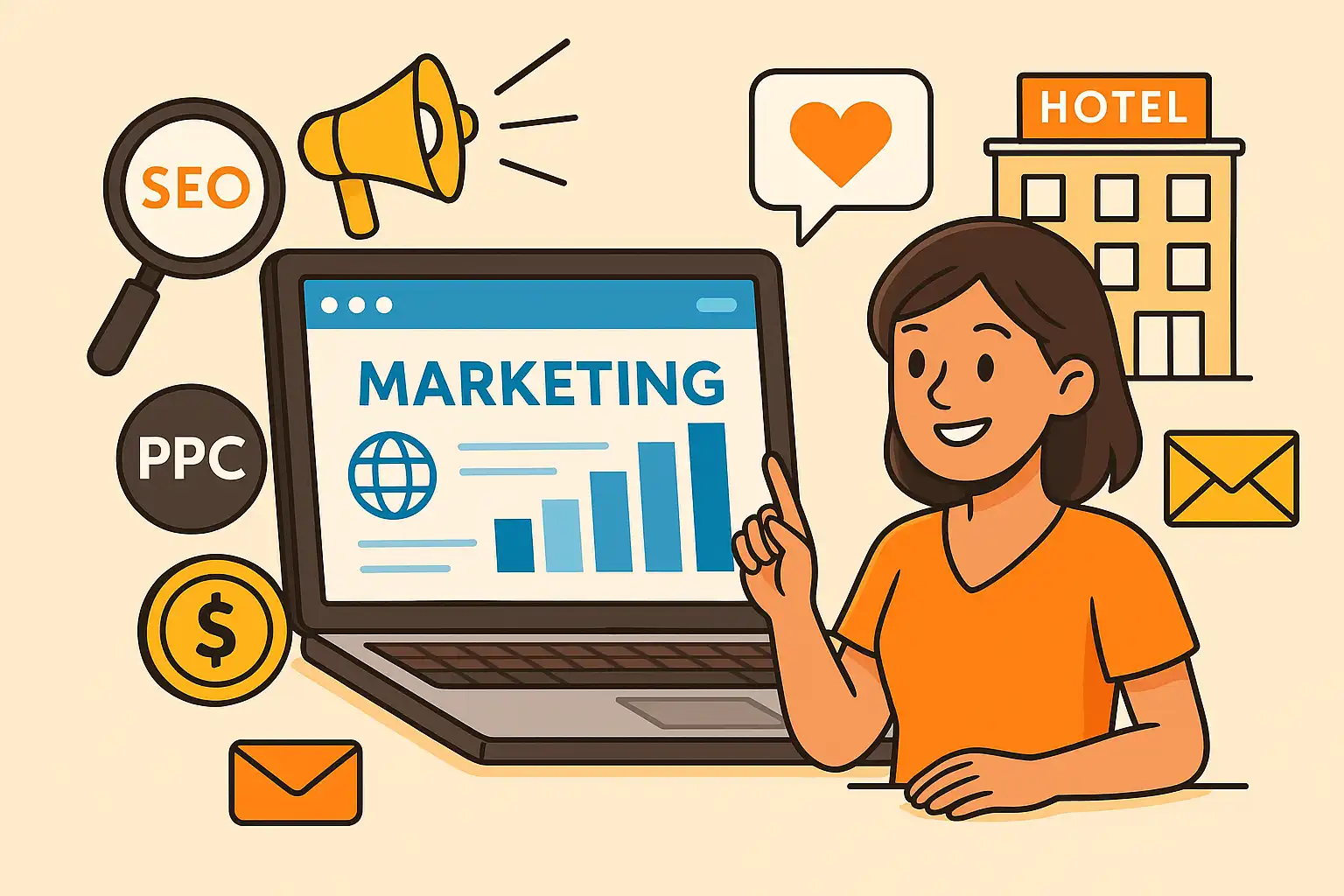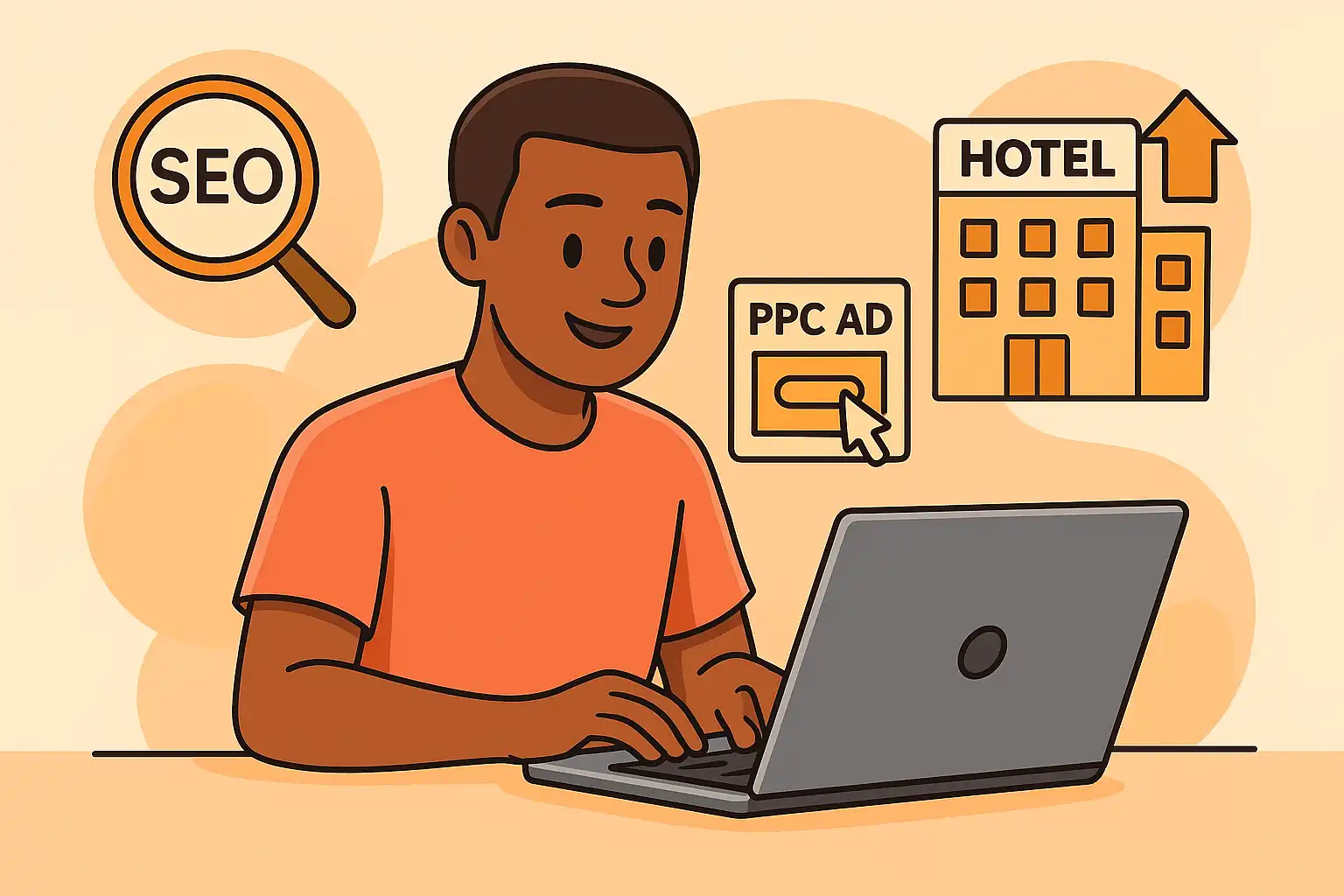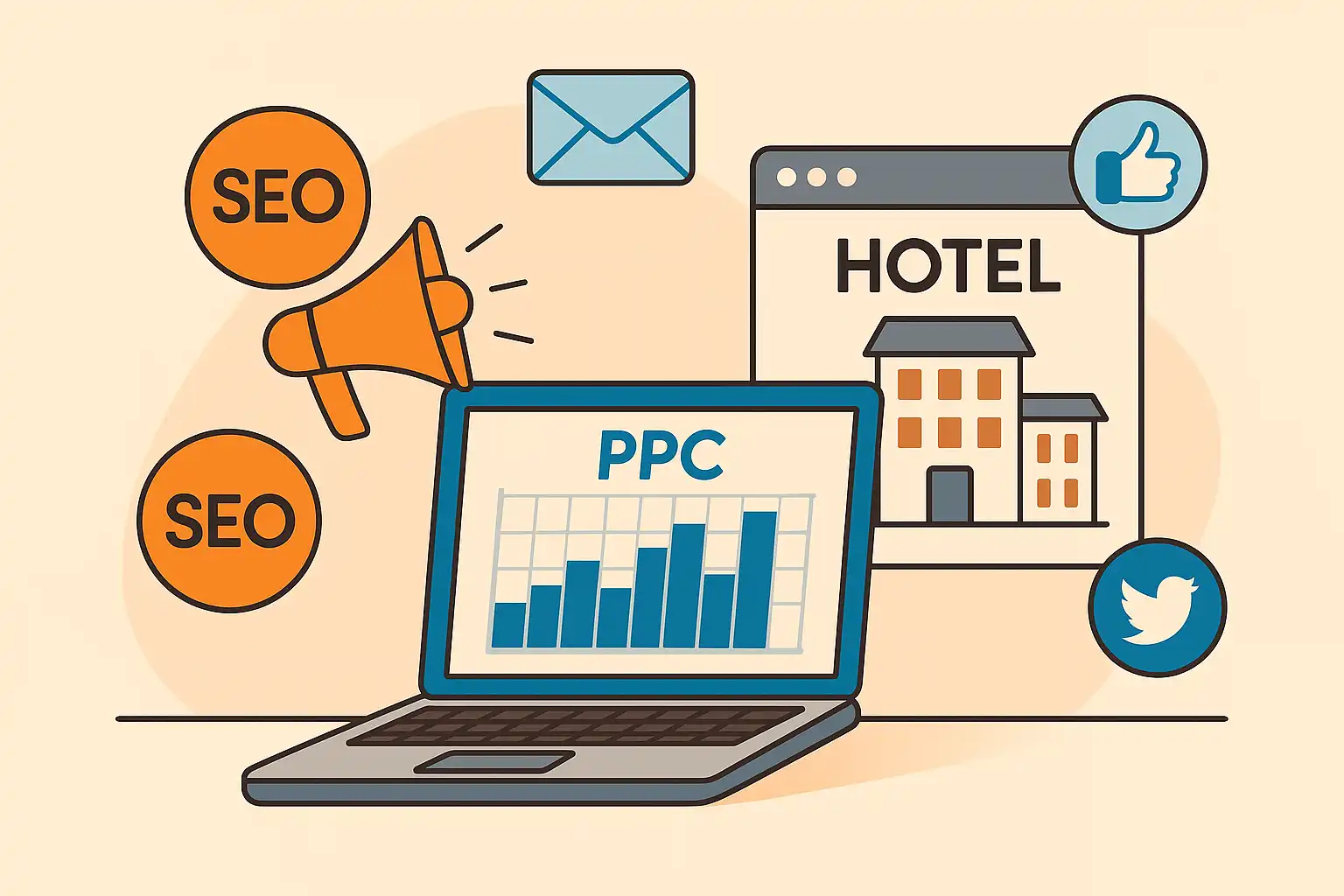Hotel Internet Marketing: Strategies for Hospitality Success
 Mika Takahashi
Mika Takahashi Mika Takahashi
Mika TakahashiThe hospitality industry has seen a digital transformation that’s reshaped how travelers find, research, and book their stays. Gone are the days when print ads and travel agents were your main marketing tools. Today, hotel internet marketing means using smart, targeted digital tactics to reach guests right when they’re deciding where to stay.
It’s not enough to just have a website anymore. You need a digital ecosystem that encourages direct bookings, builds lasting guest relationships, and helps you stand out in a crowded market. Consider this: 82% of travelers research hotels online before booking. That means your digital presence isn’t just important—it’s critical to your hotel’s success.
This guide covers everything from optimizing your website to advanced automation. We’ll share practical strategies to boost your online visibility, convert more visitors into guests, and build a competitive edge in today’s digital marketplace.

Hotel internet marketing is the strategic use of online channels to promote your property, attract potential guests, and drive bookings directly through your website. Unlike traditional marketing, this approach lets you target specific groups—whether by demographics, interests, or booking behavior—making your efforts more efficient.
It’s also measurable. You can track every click, conversion, and dollar spent, then tweak your campaigns to get better results. Plus, it’s cost-effective—you pay mostly for engagement, not just exposure.
Your hotel internet marketing strategy usually involves search engines like Google and Bing, social media platforms such as Instagram and Facebook, email campaigns, online travel agencies (OTAs), and metasearch tools like Google Hotel Ads. Each channel plays a role in guiding potential guests through their booking journey.
Right now, about 55% of travelers book hotels directly online. That’s a huge opportunity for hotels to reduce reliance on OTAs and keep more revenue in-house.
Mobile bookings now make up 60% of hotel reservations. Travelers expect to research and book easily on their phones or tablets. If your website isn’t mobile-friendly, you’re losing a big chunk of potential bookings.
Direct bookings save you 15-25% in commission fees compared to OTAs. For example, a 100-room hotel charging $150 per night could save tens of thousands of dollars annually by encouraging direct bookings. That extra revenue can go toward improving guest experiences or marketing efforts.
Online reviews are the new word-of-mouth. Over 90% of travelers read reviews before booking. A single negative review can deter many potential guests, while positive feedback builds trust and drives bookings.
Email marketing for hotels remains one of the most cost-effective channels. Recent studies show it generates $42 in revenue for every $1 spent in hospitality. It’s especially powerful for nurturing previous guests and encouraging repeat stays through personalized offers and loyalty programs.
The pandemic changed guest expectations. Travelers now want seamless digital experiences from research to post-stay communication—all on their mobile devices. Hotels that meet these expectations will thrive with their hotel digital marketing.
Your website is the heart of your hotel internet marketing efforts. It’s where interested travelers become paying guests.
Google’s mobile-first indexing means your site must be mobile-responsive. If it’s not, your search rankings and user experience will suffer.
Page load speed matters. Aim for under 3 seconds. Even a one-second delay can drop conversions by 20%. Compress images, trim unnecessary code, and use content delivery networks to speed things up.
Key features to boost direct bookings include an integrated booking engine that lets guests check availability and book without leaving your site. Adding a rate comparison widget reassures guests they’re getting the best deal. Virtual tours help reduce hesitation by letting guests explore rooms and amenities online.
Simplify the booking process. Use clear calls-to-action like “Book Now” and show guest testimonials on room pages. Highlight package deals that add value. Include trust signals such as security badges and clear cancellation policies.
Pro tip: At a boutique hotel we worked with, adding a simple “Book Now” button above the fold increased direct bookings by 18% within three months.
Your Google Business Profile is often the first thing potential guests see in local search and Google Maps. Claim and verify your listing, then fill out every detail accurately.
Upload at least 10 high-quality photos: exterior, rooms, dining, amenities, and local attractions. Update these seasonally to keep things fresh and improve local SEO.
Use Google Posts to share timely updates—special offers, events, or health and safety info. Regular posts show Google and guests that your hotel is active and engaged.
Monitor and respond to Q&A and reviews promptly. Giving detailed answers and addressing feedback builds trust and boosts your local search rankings.

Start with keyword research focused on local search intent. Use terms like “hotels in [city]” or “[amenity] hotel near [landmark].” Long-tail keywords like “pet-friendly hotel downtown [city]” often convert better.
Optimize your pages with clear title tags and meta descriptions that include your keywords and location. Use header tags to organize content logically.
Content marketing can set you apart. Create local guides, event calendars, and seasonal travel tips. This builds trust and attracts guests early in their planning.
Don’t forget technical SEO. Use schema markup for hotels to help search engines show rich results with pricing and reviews. Keep your site fast and secure with SSL certificates.
Google Hotel Ads let you appear in Google’s hotel search results with direct booking options. Set up through Google Hotel Center and connect via a trusted partner who manages real-time rates and availability.
Use bidding strategies that fit your revenue goals. Automated ROAS bidding adjusts bids based on conversion value, while manual CPC lets you control spend during peak times. Experiment to find what works best.
Free Booking Links on Google let you show your direct booking option commission-free alongside OTAs. Keep your Google Business Profile optimized and pricing competitive to qualify.
Track what matters: click-through rates, conversion rates, and cost per acquisition. Focus on bookings, not just clicks, to get the best ROI.
Structure your campaigns to reflect different search intents. Protect your brand name with dedicated ads, target competitor keywords, and capture local market searches like “hotels downtown [city].”
Write ad copy that highlights your unique selling points—location, amenities, special packages. Use specific dates and restrictions to create urgency.
Match your landing pages to ads for a seamless experience. Dedicated pages for promotions work better than sending all traffic to your homepage.
Allocate about 60% of your budget to brand campaigns, 25% to local terms, and 15% to competitor keywords.
Instagram is ideal for visual storytelling. Use Stories for behind-the-scenes glimpses, Reels for trending content, and IGTV for longer videos like virtual tours.
Facebook helps build community with targeted ads and event promotion. Use its detailed targeting to reach travelers by behavior, demographics, and interests.
TikTok is great for reaching younger travelers with authentic, fun content. Share local culture, hotel life, and participate in trends.
LinkedIn works well for B2B bookings and events. Share content that positions your hotel as a top choice for meetings and conferences.
Plan your content mix: 70% about your property and location, 20% guest features, 10% promotions. This keeps your feed engaging without feeling pushy.
Use a mix of broad and location-specific hashtags, plus a branded hashtag for your hotel.
Encourage guests to share their experiences. Run photo contests or offer incentives for tagging your hotel.
Micro-influencers (1,000-100,000 followers) often deliver better engagement than celebrities. Partner with those who align with your brand and audience. Offer complimentary stays for honest reviews and content.
Offer lead magnets like local guides or exclusive discounts to grow your email list. Place signup forms prominently on your site and during booking.
Segment your list by booking history, travel purpose, location, and spending. This lets you send targeted, relevant offers.
Follow GDPR rules: get explicit consent, allow easy unsubscribing, and protect subscriber data.
Welcome series introduce new subscribers to your hotel and local area with 3-5 emails over two weeks.
Seasonal campaigns promote time-sensitive offers tied to holidays or events.
Re-engagement campaigns target inactive subscribers and past guests with special deals.
Personalize emails with names, past stays, and tailored recommendations.

Focus on Google Reviews, TripAdvisor, Booking.com, and Expedia. Each affects your reputation differently.
Send review requests 2-3 days after checkout. Timing matters for quality and quantity.
Use personalized response templates for positive and negative reviews.
Incentivize honest reviews with loyalty points or small discounts, but never pay for positive reviews, that is not the right way to improve hotel reviews.
Respond to all reviews within 24 hours. Quick replies show you care and influence future bookings.
Have clear escalation processes for serious issues.
Show genuine concern and explain steps taken to fix problems.
Use monitoring tools like Google Alerts and Mention.com to stay on top of new reviews.
Choose OTAs based on your target audience and market. Booking.com is strong in Europe; Expedia in North America; Agoda in Asia.
Maintain rate parity to keep trust with guests and partners.
Negotiate commissions and evaluate preferred partner programs.
Balance inventory between OTAs and direct channels—usually 30% OTA, 70% direct is a good starting point.
Create a great in-stay experience that encourages loyalty program sign-ups and direct booking incentives.
Follow up post-stay with satisfaction surveys and special direct booking offers.
Use retargeting ads to reach OTA bookers with direct booking benefits.
Offer best rate guarantees, exclusive perks, and member-only rates for direct bookings.
Test your site on various devices and browsers regularly.
Make navigation touch-friendly with large buttons and easy scrolling.
Simplify booking to three steps or fewer.
Integrate mobile payment options like Apple Pay and Google Pay.
Use geofencing to target users near your property with timely offers.
Optimize for “near me” searches with accurate local info.
Send push notifications for special deals and local events.
Partner with local apps for transport or dining to create package deals.
Track website traffic sources, bounce rates, and booking conversion rates.
Monitor revenue per available room (RevPAR), average daily rate (ADR), and direct booking percentages.
Measure social media engagement and email campaign performance.
Set up Google Analytics 4 with enhanced ecommerce tracking.
Use multi-touch attribution to understand how channels work together.
Run A/B tests on landing pages, emails, and ads.
Create dashboards for regular performance reviews and strategy tweaks.
Deploy chatbots for 24/7 guest support and booking help.
Use predictive analytics to forecast demand and adjust pricing.
Optimize for voice search with conversational content.
Leverage AI for personalized website content and email campaigns.
Prepare for a cookie-less future by focusing on first-party data.
Ensure GDPR compliance with clear consent and data policies.
Adapt to iOS privacy changes with server-side tracking and email marketing.
Balance tech advances with authentic guest relationships for lasting success.
Myth vs Reality:
Myth: “Hotel internet marketing is all about flashy ads and viral content.”
Reality: It’s about targeted, measurable strategies that connect with your ideal guests and drive bookings—often through steady, consistent effort rather than hype.
Conclusion
Hotel internet marketing is no longer optional—it’s essential. By building a strong digital foundation, optimizing for mobile and local search, leveraging social media and email, and managing your reputation, you can boost bookings and increase revenue.
Start small but think big. Focus on what works for your property and guests. Keep testing and refining. The digital landscape will keep evolving, but your commitment to smart, guest-focused marketing will keep you ahead.
Key Takeaways
By applying these strategies thoughtfully, you’ll position your hotel for success now and beyond. Let’s get to work.